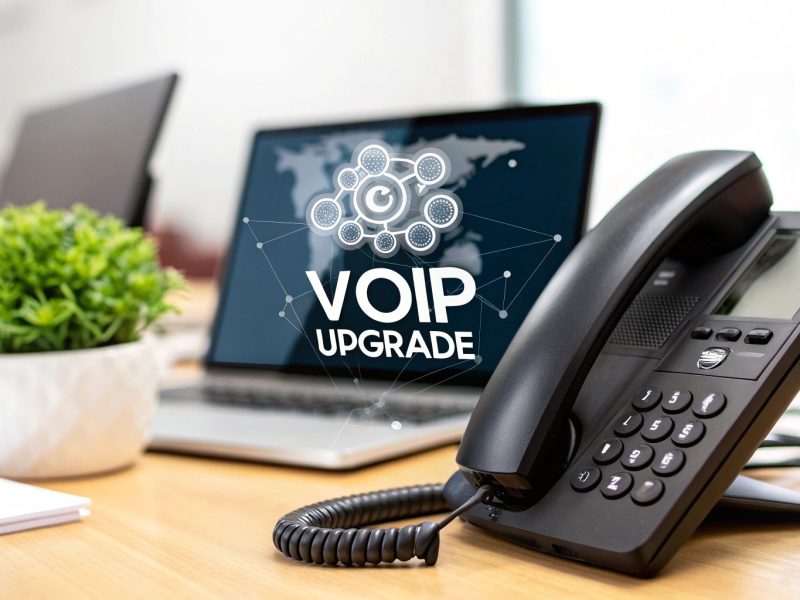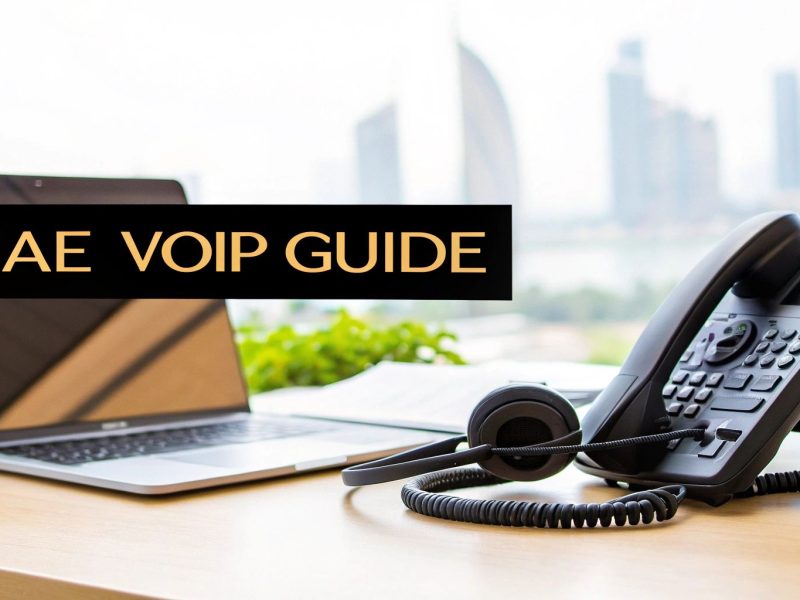Elevate Your Customer Interactions with Cutting-Edge Contact Center Software
Struggling to manage customer communication effectively? This list of top 10 contact center software solutions for 2025 provides the tools your business needs to streamline operations and improve customer satisfaction. We'll cover leading platforms like CloudMove, Zendesk, Five9, Genesys Cloud CX, RingCentral, Amazon Connect, Freshworks, Twilio Flex, 8×8, and Talkdesk, highlighting key features to help you choose the best contact center software for your organization.
1. Cloud Move: A Comprehensive Contact Center Solution for the Modern AE Business
Cloud Move positions itself as a one-stop shop for enterprise telephony and cloud-managed contact center solutions, catering to a wide spectrum of businesses in the AE region, from small startups to large corporations. It promises to streamline customer interactions and empower businesses to deliver exceptional customer experiences. Its appeal lies in its comprehensive feature set, flexible deployment options, and robust integrations, making it a compelling option for businesses looking to modernize their communication infrastructure. Cloud Move focuses on delivering a unified platform for multichannel engagement, enabling businesses to connect with customers through various touchpoints, including voice, SMS, social media, web chat, email, and WhatsApp. This integrated approach aims to eliminate communication silos and provide a 360-degree view of the customer journey.
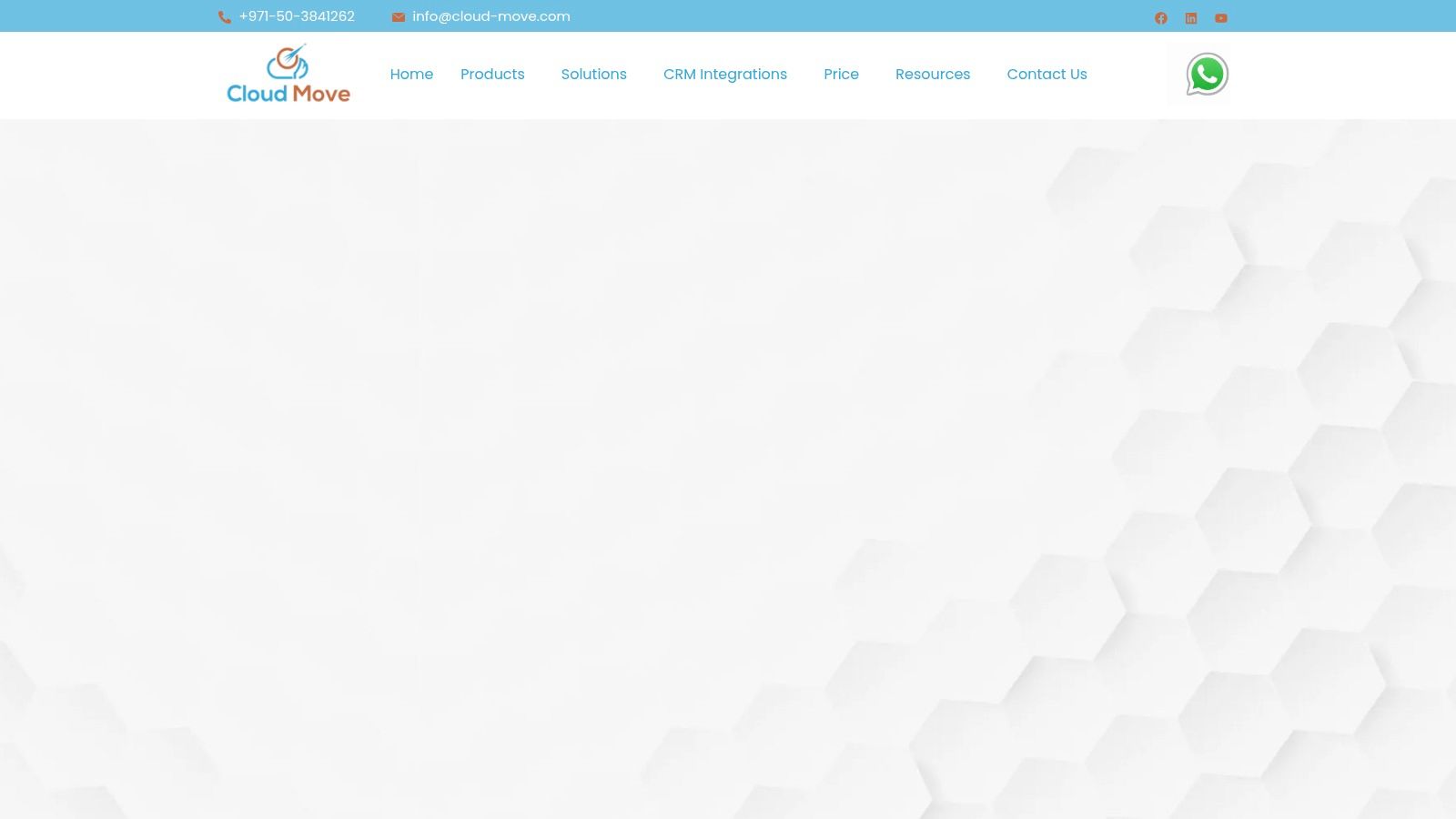
For businesses operating in the UAE, Cloud Move's strategic partnerships with local telecom giants like Etisalat and DU are particularly noteworthy. These partnerships ensure high-quality voice services and reliable connectivity, crucial for maintaining seamless communication with customers. Moreover, the platform's adherence to local regulations ensures data security and confidentiality, a critical factor for businesses operating in regulated industries such as healthcare and finance. This commitment to compliance offers peace of mind and reinforces trust with customers.
Cloud Move offers several deployment options—cloud, on-premise, or hybrid—allowing businesses to choose the model that best aligns with their existing infrastructure and strategic goals. This flexibility is a key advantage, especially for businesses with specific IT requirements or those undergoing a phased transition to the cloud. For example, a company with significant on-premise investments can opt for a hybrid model, gradually migrating to the cloud while leveraging existing infrastructure.
Integrating with leading CRM systems like Microsoft Dynamics 365, Salesforce, Zoho, and HubSpot is another strong point. This integration allows businesses to consolidate customer data and gain valuable insights into customer behavior, enabling personalized interactions and targeted marketing campaigns. Imagine a customer contacting support; the agent can instantly access the customer's history and preferences, leading to faster resolution times and improved customer satisfaction.
One of the standout features of Cloud Move is its commitment to supporting its customers. The platform offers 24/7 live support, comprehensive agent and supervisor training programs, and customizable integrations with CRM, ticketing, and ERP systems. This level of support can significantly reduce the learning curve and empower businesses to maximize their return on investment. Furthermore, the availability of expert consultancy services and a free demo allows businesses to thoroughly evaluate the platform and its suitability for their specific needs.
While Cloud Move offers a compelling suite of features and benefits, it's important to consider some potential drawbacks. One notable omission is the lack of publicly available pricing information. Businesses interested in Cloud Move will need to contact the company directly for a quote, which can be time-consuming. Additionally, smaller businesses without dedicated IT resources might find the initial setup and customization process somewhat complex, particularly if they are integrating with multiple systems.
Implementation and Setup Tips:
- Assess your current infrastructure: Determine whether a cloud, on-premise, or hybrid deployment model best suits your needs.
- Identify key integrations: Prioritize integrating with your existing CRM, ticketing, and ERP systems to maximize data utilization.
- Leverage the training programs: Ensure your agents and supervisors are fully trained to utilize the platform's features effectively.
- Consult with Cloud Move experts: Utilize the free demo and consultancy services to understand how the platform can address your specific business challenges.
Cloud Move deserves its place on this list due to its comprehensive features, flexible deployment options, and robust integrations, making it a powerful solution for businesses in the AE region seeking a modern, scalable contact center solution. However, the lack of transparent pricing and potential setup complexity for smaller businesses should be considered when evaluating this platform. To learn more and request a demo, visit their website: https://cloud-call-center.ae
2. Zendesk
Zendesk is a prominent player in the contact center software market, providing a robust cloud-based customer service platform suitable for businesses of all sizes, from startups to enterprise organizations. It earns its spot on this list due to its user-friendly interface, comprehensive feature set, and strong focus on omnichannel customer engagement, which are vital components for businesses operating in the fast-paced AE region. This comprehensive platform offers a solid foundation for building a modern, efficient contact center focused on delivering exceptional customer experiences.
Zendesk’s core strength lies in its ability to unify communication channels. It seamlessly integrates voice, email, chat, social media, and even messaging apps like WhatsApp into a single platform. This omnichannel approach empowers agents to manage all customer interactions from one place, providing a consistent and personalized experience regardless of how customers choose to reach out. This is especially crucial in the UAE, where customers are increasingly digitally savvy and expect businesses to be readily available across various channels.
For businesses looking to streamline their call center operations, Zendesk offers advanced call routing and Interactive Voice Response (IVR) capabilities. These features enable efficient call handling, directing customers to the right agents based on their needs and minimizing wait times. Real-time analytics and reporting dashboards offer valuable insights into agent performance, call volumes, and customer satisfaction, allowing managers to optimize workflows and improve service levels.
Zendesk also shines in its CRM integration capabilities. By connecting with existing CRM systems, it provides agents with complete customer context, including past interactions, purchase history, and other relevant information. This 360-degree view empowers agents to personalize interactions and deliver more effective support. For organizations in regulated sectors like healthcare or finance, this contextual information is crucial for ensuring compliance and providing accurate, personalized service.
Beyond its core features, Zendesk provides workforce management and scheduling tools, enabling contact center supervisors to optimize staffing levels, forecast demand, and efficiently manage agent schedules. These capabilities are particularly useful for businesses experiencing fluctuating call volumes or operating across multiple time zones, which is common in the AE region.
One of Zendesk's key differentiators is its intuitive and easy-to-use interface. This simplifies onboarding and training for new agents, reducing the learning curve and allowing them to become productive quickly. The platform also boasts a strong integration ecosystem with over 1000+ apps, allowing businesses to customize their Zendesk instance and connect it with other business-critical applications. This flexibility and extensibility make Zendesk a suitable choice for businesses with unique requirements or existing technology stacks.
While Zendesk offers a powerful and comprehensive solution, it's essential to consider its limitations. While the platform offers flexible pricing tiers for different business sizes, it can become expensive with add-ons. For example, the voice functionality requires a separate Talk add-on, which can add to the overall cost. Additionally, customization options are limited in the lower pricing tiers. Businesses looking for highly customized solutions or extensive voice features may need to consider the higher tiers, which can be a significant investment.
Learn more about Zendesk and other CRM options for call centers in the region. This resource can help you understand how Zendesk compares with other similar tools available in the market.
Implementing Zendesk can be relatively straightforward due to its user-friendly interface and comprehensive documentation. However, for larger organizations or those with complex integration requirements, professional services may be beneficial. Zendesk offers various support and training resources, including online documentation, webinars, and a dedicated customer support team.
Zendesk offers a variety of pricing plans to suit different business needs. Specific pricing details are available on their website. Technical requirements are minimal, as Zendesk is a cloud-based platform accessible via a web browser. A stable internet connection is the primary requirement for optimal performance.
For businesses in the AE region looking for a robust, scalable, and user-friendly contact center software solution, Zendesk is undoubtedly a strong contender. Its omnichannel capabilities, advanced features, and strong integration ecosystem make it a suitable choice for organizations of all sizes, particularly those focused on delivering exceptional customer experiences across various channels. However, potential users should carefully evaluate their needs and budget to ensure that Zendesk’s features and pricing align with their specific requirements. Consider the need for add-ons, like the Talk add-on for voice capabilities, when evaluating the total cost.
3. Five9
Five9 is a robust, cloud-based contact center software solution specifically designed for enterprise-level operations. It's a powerful platform offering a comprehensive suite of tools to manage customer interactions across multiple channels, including voice, email, chat, social media, and video. Five9 distinguishes itself through its advanced AI-powered features, focus on agent productivity, and sophisticated routing capabilities. Its strength lies in its ability to streamline complex communication workflows and deliver a superior customer experience, making it a top contender for businesses with high contact volumes and demanding service level agreements.
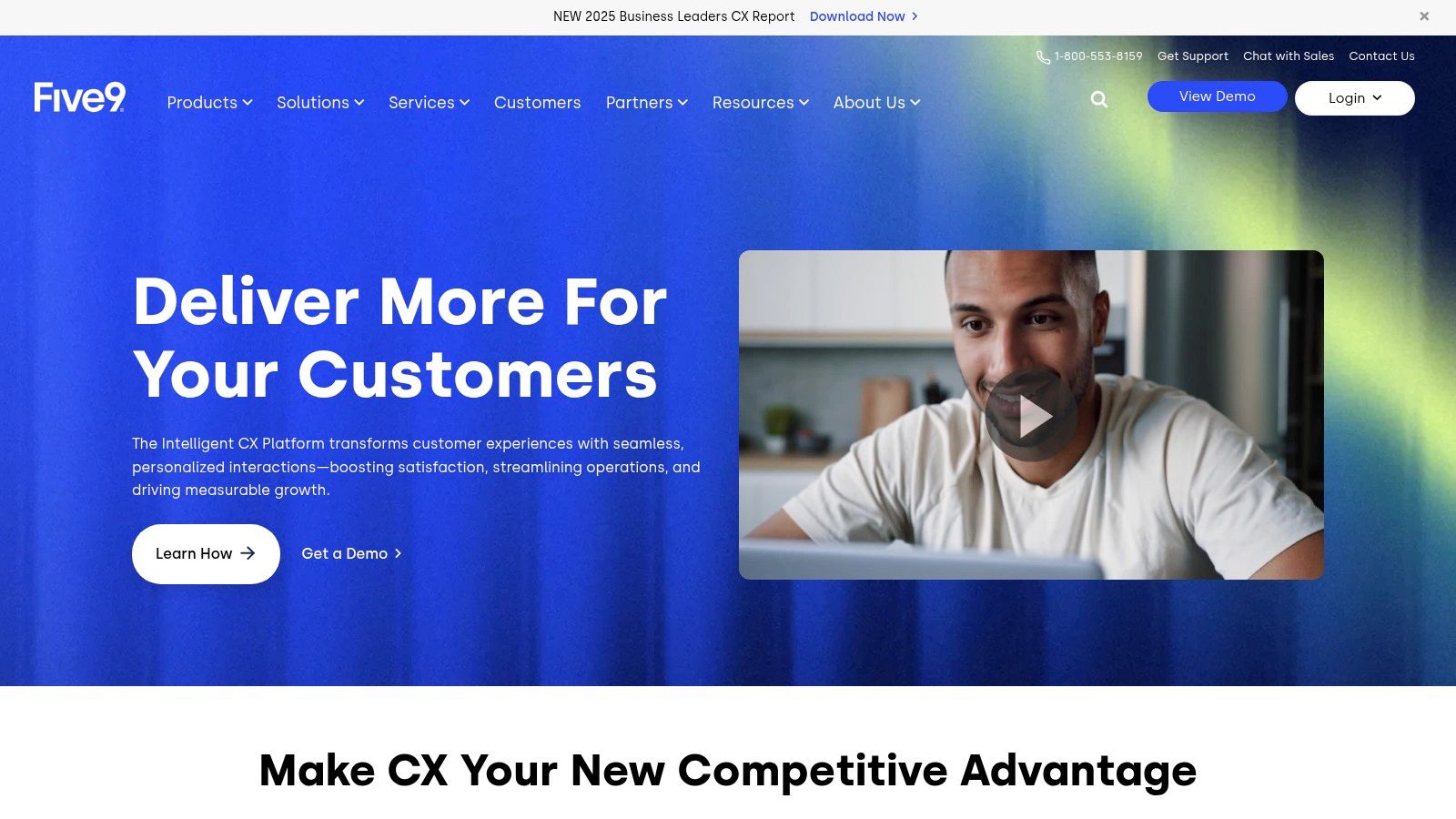
Five9's inclusion in this list is warranted by its comprehensive feature set aimed at optimizing agent performance and enhancing the overall customer journey. Let's dive into some of its key features: AI-powered intelligent routing efficiently directs incoming inquiries to the most appropriate agent based on skillset, availability, and customer history. This intelligent routing significantly reduces wait times and improves first-call resolution rates. The platform also includes virtual agents capable of handling routine inquiries, freeing up human agents to focus on more complex customer issues. Furthermore, Five9 offers a comprehensive workforce optimization (WFO) suite, including quality management, performance dashboards, and gamification features designed to boost agent morale and productivity.
For enterprises in the AE region, Five9 provides advanced predictive dialing and campaign management tools, essential for outbound sales and marketing efforts. Real-time speech analytics and sentiment analysis provide valuable insights into customer interactions, enabling businesses to identify areas for improvement and personalize customer service. Robust API and integration capabilities allow Five9 to seamlessly integrate with existing CRM systems and other business applications, providing a unified view of the customer and streamlining workflows. This is particularly relevant for businesses in regulated sectors like healthcare, finance, and logistics in the AE region where data security and compliance are paramount.
While Five9 excels in its advanced functionalities, it is important to consider its potential drawbacks. The platform comes with a higher price point compared to some other contact center software solutions, primarily due to its enterprise-focus and comprehensive feature set. The setup and configuration process can be complex and may require specialized technical expertise. New users may also experience a steep learning curve due to the breadth of features and advanced functionalities. However, Five9 provides extensive training resources and customer support to assist with implementation and ongoing usage.
While pricing isn’t publicly available, it typically follows a subscription model based on the number of users and features required. Technical requirements vary depending on the specific features implemented but generally require a stable internet connection and compatible web browsers. Compared to other enterprise-grade solutions like Genesys or Avaya, Five9 offers a more modern, cloud-native architecture, providing greater flexibility and scalability.
Implementing Five9 effectively requires careful planning and consideration. Begin by clearly defining your contact center requirements and objectives. Thoroughly assess your existing infrastructure and identify any integration needs. Engage with Five9’s implementation team or a certified partner to develop a tailored implementation plan. Prioritize training for your agents and supervisors to ensure they can leverage the platform’s full potential. Start with a phased rollout, focusing on key features and gradually expanding usage as your team becomes more comfortable with the system. Regularly monitor performance metrics and gather feedback from your agents to identify areas for optimization and continuous improvement. By following these steps, businesses in the AE region can leverage Five9’s powerful features to enhance their customer experience, optimize agent performance, and drive business growth. This makes it a valuable contact center software solution for enterprises seeking a comprehensive and scalable platform.
4. Genesys Cloud CX
Genesys Cloud CX is a robust, all-in-one cloud contact center software solution designed for mid-market to enterprise organizations looking to elevate their customer experience. It goes beyond traditional contact center functionalities by integrating workforce engagement management and customer journey orchestration into a single platform. This allows businesses to not only manage customer interactions efficiently but also optimize agent performance and personalize the customer journey across all touchpoints. This comprehensive approach makes Genesys Cloud CX a compelling option for businesses seeking a truly unified customer experience platform. It deserves its place on this list due to its powerful features, scalability, and focus on delivering personalized customer journeys.
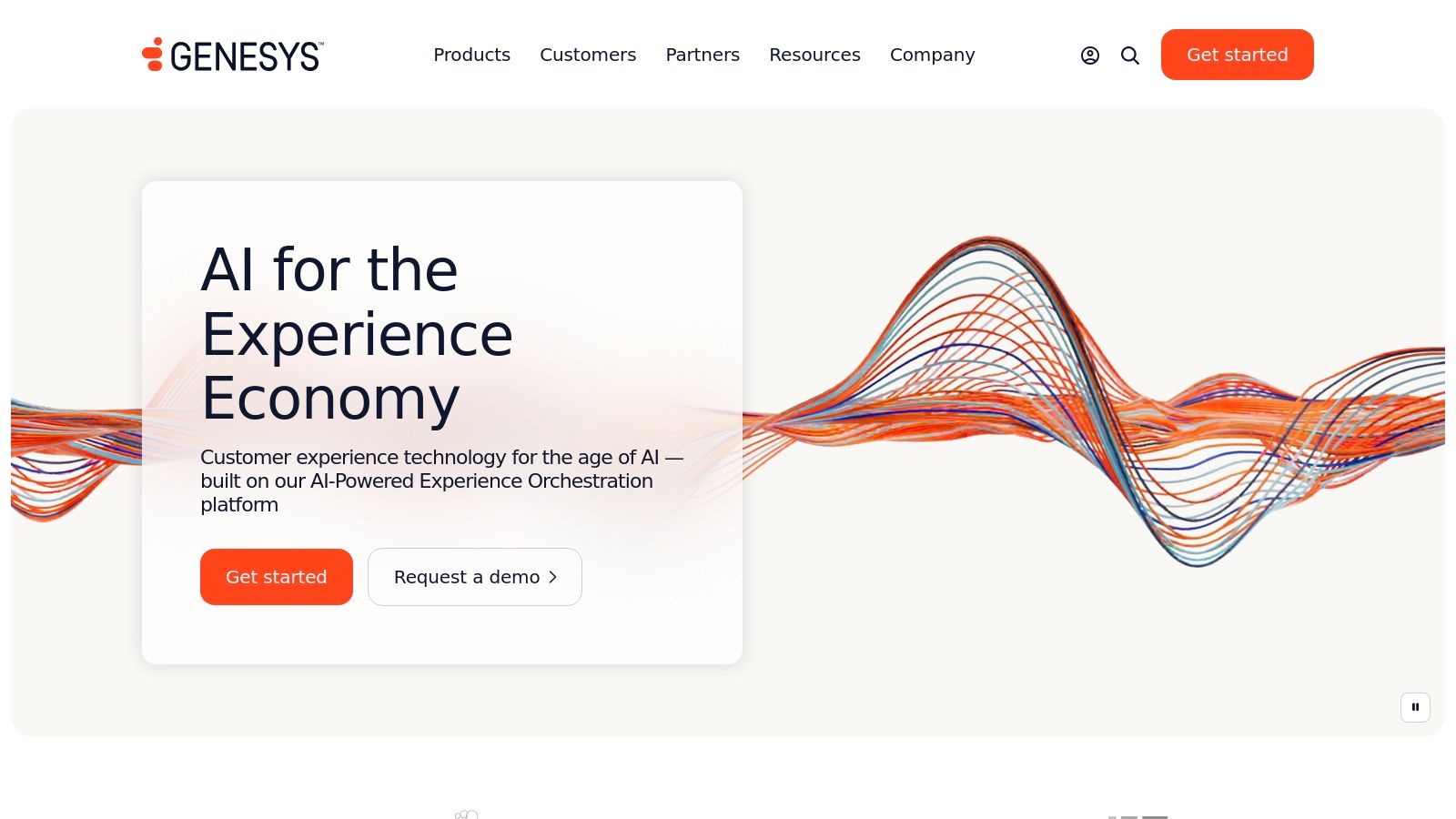
For businesses operating in the AE region, Genesys Cloud CX offers localized support and features, catering to the specific needs and regulations of this diverse market. This includes language support, regional data centers, and compliance with local regulations, making it a suitable choice for organizations in sectors like healthcare, finance, and logistics with stringent compliance requirements.
Omnichannel engagement is a key strength of Genesys Cloud CX. It seamlessly integrates voice, email, chat, social media, and messaging apps into a single interface, providing agents with a holistic view of the customer. This unified approach empowers agents to deliver personalized and consistent support regardless of the channel, leading to improved customer satisfaction. The platform’s robust routing engine intelligently directs interactions to the most appropriate agent based on skills, availability, and customer history, further optimizing efficiency and ensuring prompt resolution.
Journey analytics and customer experience mapping features within Genesys Cloud CX provide valuable insights into customer behavior and preferences. Businesses can visualize the entire customer journey, identify pain points, and proactively optimize interactions to deliver a seamless and personalized experience. This data-driven approach empowers organizations to anticipate customer needs and proactively address potential issues, driving customer loyalty and increasing revenue.
Genesys Cloud CX leverages AI-powered chatbots and virtual assistants to automate routine tasks and provide 24/7 customer support. These intelligent bots can handle simple inquiries, freeing up human agents to focus on more complex issues. The platform also offers workforce engagement management tools that help optimize agent scheduling, performance monitoring, and training, further enhancing productivity and ensuring consistent service quality. For organizations seeking customized solutions, Genesys Cloud CX offers open APIs and extensive third-party integrations, allowing seamless connectivity with existing CRM systems, marketing automation platforms, and other business-critical applications.
While Genesys Cloud CX offers a comprehensive suite of features, it's important to consider the potential drawbacks. The premium pricing structure might be prohibitive for smaller organizations with limited budgets. Furthermore, the platform's vast functionalities can be overwhelming for users unfamiliar with such comprehensive systems. Implementing advanced features may also require significant technical expertise and dedicated resources.
Implementation and Setup Tips:
- Phased Approach: Start by implementing core functionalities like omnichannel routing and basic reporting before moving on to more advanced features like journey orchestration and AI-powered tools.
- Training and Support: Invest in comprehensive training for both administrators and agents to maximize platform adoption and ensure efficient usage.
- Integration Planning: Carefully plan integrations with existing systems to avoid data silos and ensure seamless data flow.
While specific pricing details are not publicly available, Genesys Cloud CX typically operates on a subscription-based model, with pricing tiers based on the number of users, features, and support level. Contact Genesys directly for a customized quote based on your specific requirements. Technical requirements vary depending on the chosen deployment and integrations, but generally require a stable internet connection and compatible web browsers.
Compared to other contact center software solutions like Talkdesk and Five9, Genesys Cloud CX differentiates itself through its comprehensive customer journey management capabilities and robust AI and machine learning functionalities. While these competitors offer strong contact center solutions, Genesys Cloud CX takes a more holistic approach by focusing on the entire customer lifecycle, making it a strong contender for organizations prioritizing personalized customer experiences.
You can explore more about Genesys Cloud CX and its features on their website: https://www.genesys.com
5. RingCentral Contact Center
RingCentral Contact Center stands out as a robust cloud-based solution, seamlessly integrated with RingCentral's unified communications platform. This integration offers a significant advantage for businesses in the AE region seeking a streamlined approach to communication, combining voice, video, team messaging, and contact center capabilities within a single platform. This eliminates the need for multiple disparate systems, simplifying management and reducing IT overhead. It's particularly appealing for organizations looking to enhance internal collaboration alongside customer engagement. This all-in-one approach makes RingCentral a strong contender in the competitive contact center software landscape.
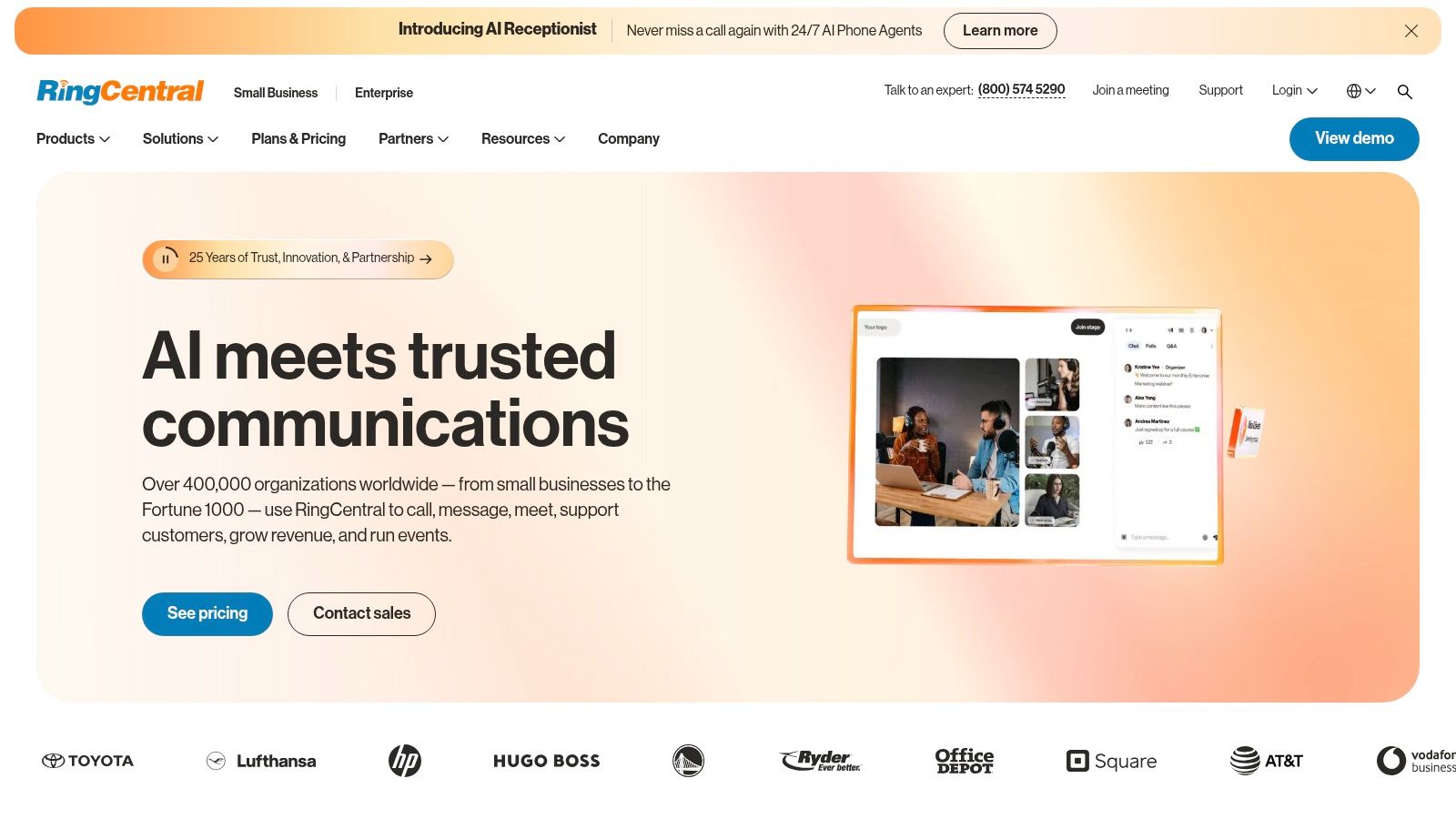
RingCentral Contact Center excels in omnichannel customer engagement, allowing businesses to interact with customers across various channels like voice, email, chat, SMS, and social media. This unified approach ensures a consistent customer experience regardless of the communication channel. The platform also features intelligent call routing, including skills-based routing, ensuring that customer inquiries are directed to the most qualified agent, minimizing wait times and maximizing first-call resolution rates. Real-time and historical analytics provide valuable insights into agent performance, call volumes, and customer satisfaction, enabling data-driven decision-making for continuous improvement. Learn more about RingCentral Contact Center to delve deeper into the benefits of a truly integrated omnichannel strategy.
For businesses operating in the AE region, RingCentral's strong mobile capabilities are particularly advantageous. Mobile apps for agents and supervisors allow for remote work and on-the-go management, fostering flexibility and business continuity. This is especially relevant in today’s increasingly mobile workforce and for businesses with distributed teams. Furthermore, its competitive pricing for the mid-market makes it an attractive option for growing businesses in the region looking for a scalable and cost-effective contact center software solution.
While RingCentral offers a compelling suite of features, it’s important to consider its limitations. Compared to dedicated contact center software specialists, its advanced AI features are somewhat limited. This might be a factor for businesses looking to leverage cutting-edge AI functionalities like predictive routing or sentiment analysis. Additionally, customization options for complex requirements are less extensive than some competitors, potentially posing challenges for businesses with highly specialized workflows. The reporting capabilities, while functional, could also be more robust, offering more granular data analysis and visualization options.
While pricing details aren't readily available on the main website, potential users can request a quote tailored to their specific needs. Technically, the cloud-based nature of RingCentral Contact Center minimizes on-premise infrastructure requirements. Primarily, a stable internet connection and compatible devices (desktops, laptops, smartphones) are necessary for implementation. The platform is designed for quick deployment, minimizing disruption to ongoing operations.
For implementation, businesses should begin by clearly defining their contact center requirements and objectives. Mapping out existing workflows and integrating them with RingCentral’s features is crucial. Thorough agent training on the platform is essential for maximizing efficiency and ensuring a smooth transition. Leveraging RingCentral’s professional services for implementation and ongoing support can further streamline the process and ensure successful adoption.
RingCentral Contact Center deserves its place on this list due to its unified communications integration, omnichannel capabilities, and robust mobile features. It's a particularly strong choice for mid-market businesses in the AE region seeking a user-friendly, competitively priced, and scalable contact center solution. However, organizations with highly complex requirements or a need for advanced AI and analytics should carefully evaluate their needs against RingCentral's capabilities. You can explore more about RingCentral Contact Center and its features by visiting their website: https://www.ringcentral.com. By carefully weighing its pros and cons, businesses can determine if RingCentral Contact Center is the right fit for their specific contact center software needs.
6. Amazon Connect
Amazon Connect is a powerful cloud-based contact center software solution offered by Amazon Web Services (AWS). Its key strength lies in its flexibility and scalability, making it an attractive option for businesses of all sizes, from startups to enterprises. Leveraging the robust AWS infrastructure and a wealth of integrated AI services, Amazon Connect delivers a comprehensive platform for handling customer interactions across multiple channels. This pay-as-you-go model eliminates upfront costs and allows businesses in the AE region to only pay for the services they consume, maximizing cost efficiency and resource allocation. Whether you're a small business just starting out or a large enterprise looking for a flexible contact center solution, Amazon Connect offers the potential to streamline your operations and enhance customer experiences.
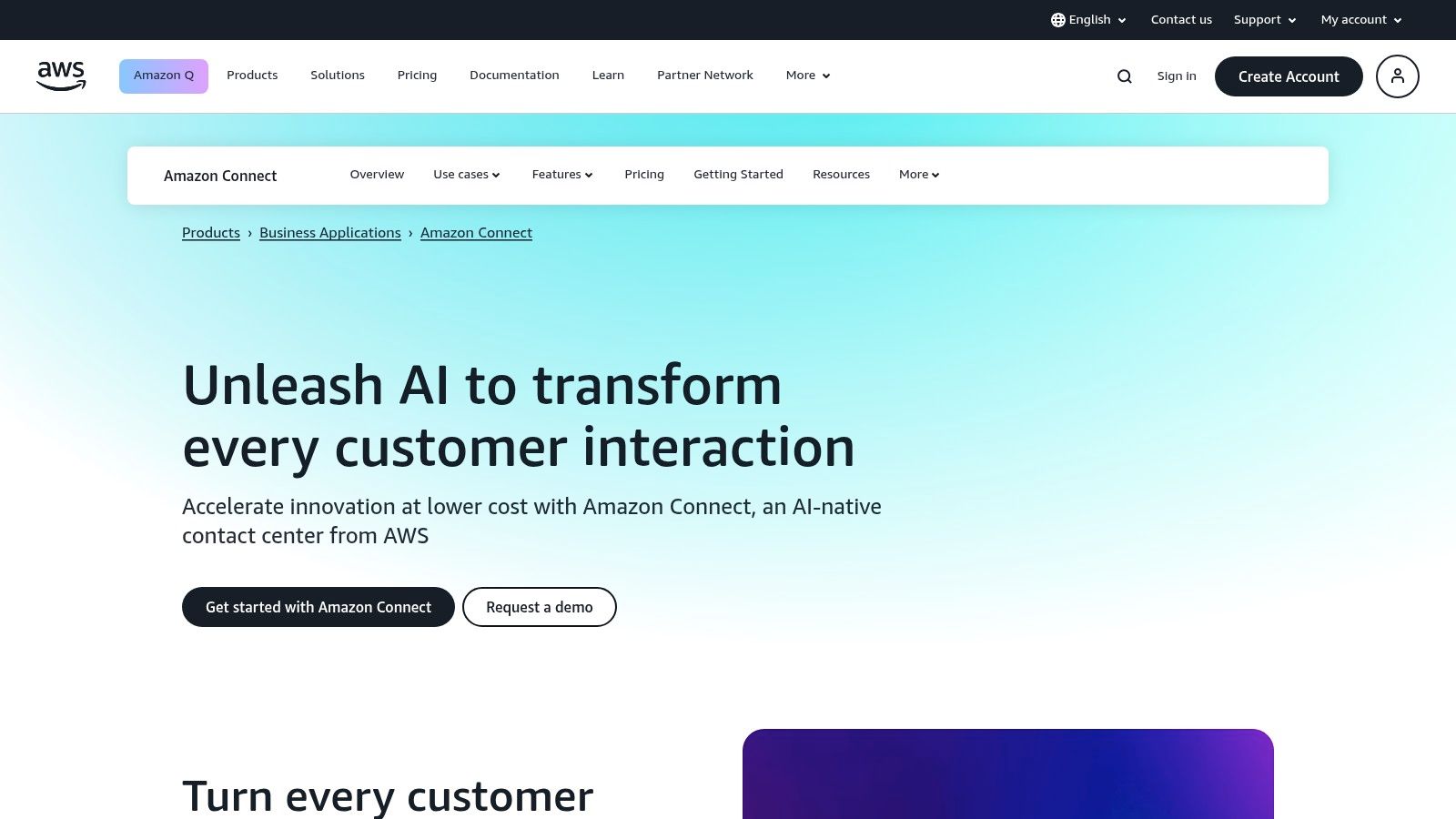
One of Amazon Connect's most compelling features is its pay-per-use pricing structure. Unlike traditional contact center software that often involves hefty licensing fees and long-term contracts, Amazon Connect’s pricing model makes it exceptionally cost-effective, particularly for businesses with fluctuating call volumes. This model allows companies to scale their contact center operations up or down as needed, adapting to seasonal demands or business growth without incurring unnecessary expenses. This flexibility is particularly beneficial for businesses in the AE region, where market dynamics can shift rapidly.
Amazon Connect seamlessly integrates with other AWS services, including powerful AI tools like Amazon Lex for conversational bots, Amazon Polly for text-to-speech capabilities, and Amazon Comprehend for sentiment analysis. This tight integration allows businesses to build intelligent, self-service solutions, automate routine tasks, and gain valuable insights into customer interactions. For example, businesses can use Lex to create chatbots that handle basic customer inquiries, freeing up human agents to focus on more complex issues. Polly can be used to personalize automated messages, while Comprehend can analyze customer feedback to identify areas for improvement. This deep integration within the AWS ecosystem offers a distinct advantage over standalone contact center software solutions.
The visual contact flow designer simplifies the process of creating and managing call flows. Even without extensive technical expertise, users can visually design interactive voice response (IVR) systems, route calls to appropriate agents, and integrate with other systems. This intuitive interface reduces the need for specialized developers, empowering contact center supervisors and team leads to manage and optimize call flows based on real-time needs.
For IT managers, Amazon Connect's API-first architecture provides extensive customization and integration options. This allows seamless integration with existing CRM systems, workforce management tools, and other business applications. Furthermore, Amazon Connect's robust infrastructure ensures high availability and reliability, crucial for maintaining uninterrupted customer service. The platform offers real-time and historical metrics, providing valuable data for monitoring agent performance, identifying trends, and optimizing contact center operations. This level of data granularity allows for informed decision-making and continuous improvement.
While Amazon Connect offers numerous advantages, it's essential to be aware of its potential drawbacks. The initial setup and configuration can require some technical expertise, particularly for complex integrations and custom workflows. While the visual contact flow designer simplifies many tasks, leveraging the full potential of the platform may necessitate developer involvement. Furthermore, while the platform is constantly evolving, the range of out-of-the-box features may be less extensive than some established contact center software solutions. For organizations with highly specialized requirements, some customization might be needed.
For businesses in regulated sectors such as healthcare, finance, and logistics, Amazon Connect's security features and compliance certifications are important considerations. Leveraging the robust security infrastructure of AWS, the platform helps organizations meet stringent compliance requirements.
In summary, Amazon Connect deserves its place on this list due to its cost-effective pricing model, scalability, and seamless integration with the AWS ecosystem. While it requires some technical expertise, the platform offers significant advantages for businesses seeking a flexible, powerful, and cost-effective contact center software solution. Visit their website (https://aws.amazon.com/connect) for more information.
7. Freshworks Customer Service Suite
For growing businesses seeking a unified approach to customer engagement, the Freshworks Customer Service Suite stands out as a compelling contact center software option. It’s more than just a call center solution; it's a comprehensive platform encompassing helpdesk, CRM, and marketing automation, making it a strong contender for businesses looking to streamline their customer interactions. This integrated approach allows companies to manage all aspects of the customer journey from a single platform, enhancing agent efficiency and improving the overall customer experience. This is particularly valuable for SMBs in the AE region looking for a scalable yet affordable solution to manage increasing customer interaction volumes.
Freshworks caters to a diverse target audience including small to mid-sized businesses seeking scalable contact center solutions, and it offers a compelling blend of functionality and affordability. Enterprise IT managers will appreciate the secure cloud-based deployment, while contact center supervisors and team leads will find value in the team collaboration tools and (while somewhat limited) reporting features. The platform’s focus on unified multichannel engagement makes it attractive to customer experience and support teams, while its robust feature set positions it as a viable option even for organizations in regulated sectors.
This contact center software shines in its omnichannel capabilities. It offers integrated ticketing and phone support, allowing agents to seamlessly switch between channels and maintain context across all customer interactions. AI-powered chatbots and automation features further enhance efficiency by handling routine inquiries and freeing up agents to focus on more complex issues. For example, a chatbot can handle initial questions about product availability, order status, or business hours, escalating complex queries to a live agent when necessary. This automation not only reduces agent workload but also provides customers with instant support, improving satisfaction and response times. This is especially beneficial for businesses in the AE region experiencing rapid growth and needing to handle increasing customer inquiries without a proportional increase in staff.
The integrated CRM and customer data platform provides agents with a 360-degree view of the customer, empowering them to provide personalized and efficient support. This holistic view is crucial for understanding customer history, preferences, and past interactions, enabling agents to anticipate needs and deliver proactive support. The platform also fosters team collaboration through shared inboxes, internal chat, and knowledge management features. This allows agents to collaborate on complex cases, share best practices, and maintain a consistent level of service across the team.
Freshworks offers a marketplace with 1000+ integrations, allowing businesses to connect with their existing tools and streamline workflows. These integrations can include popular CRM systems, marketing automation platforms, e-commerce platforms, and more. This flexibility allows businesses to tailor the platform to their specific needs and create a truly integrated customer service ecosystem.
While Freshworks boasts a compelling feature set, there are some areas for improvement. While the platform offers a good balance of features for SMBs, its advanced contact center features are somewhat limited compared to enterprise-grade solutions. For instance, while it offers basic call routing and queuing, it may lack more sophisticated features like workforce optimization or advanced analytics that larger call centers might require. Reporting functionality, while present, could be more robust and offer more granular insights into agent performance and call center metrics. Some users have also reported occasional voice quality issues, although this appears to be an infrequent occurrence.
Freshworks offers tiered pricing based on features and the number of users. Detailed pricing information is available on their website. Technical requirements are minimal as the platform is cloud-based and accessed through a web browser. Implementation is generally straightforward, aided by the user-friendly interface and readily available documentation. For businesses seeking a cost-effective, easy-to-implement contact center software with a strong focus on integrated customer engagement, Freshworks is a strong contender. While its advanced contact center features may be limited, its comprehensive suite of tools, affordable pricing, and ease of use make it a compelling option, especially for growing businesses in the AE region looking to scale their customer service operations. You can explore their offerings further at https://www.freshworks.com.
8. Twilio Flex
Twilio Flex stands out as a highly programmable and customizable cloud contact center platform, making it a powerful choice for businesses seeking tailored solutions. Unlike traditional, out-of-the-box contact center software, Twilio Flex offers unparalleled control over every aspect of the customer interaction journey. This flexibility is particularly valuable for organizations with unique workflows, complex integration needs, or a desire to rapidly adapt to changing market demands. This makes it a strong contender for businesses in the AE region looking for cutting-edge contact center software.
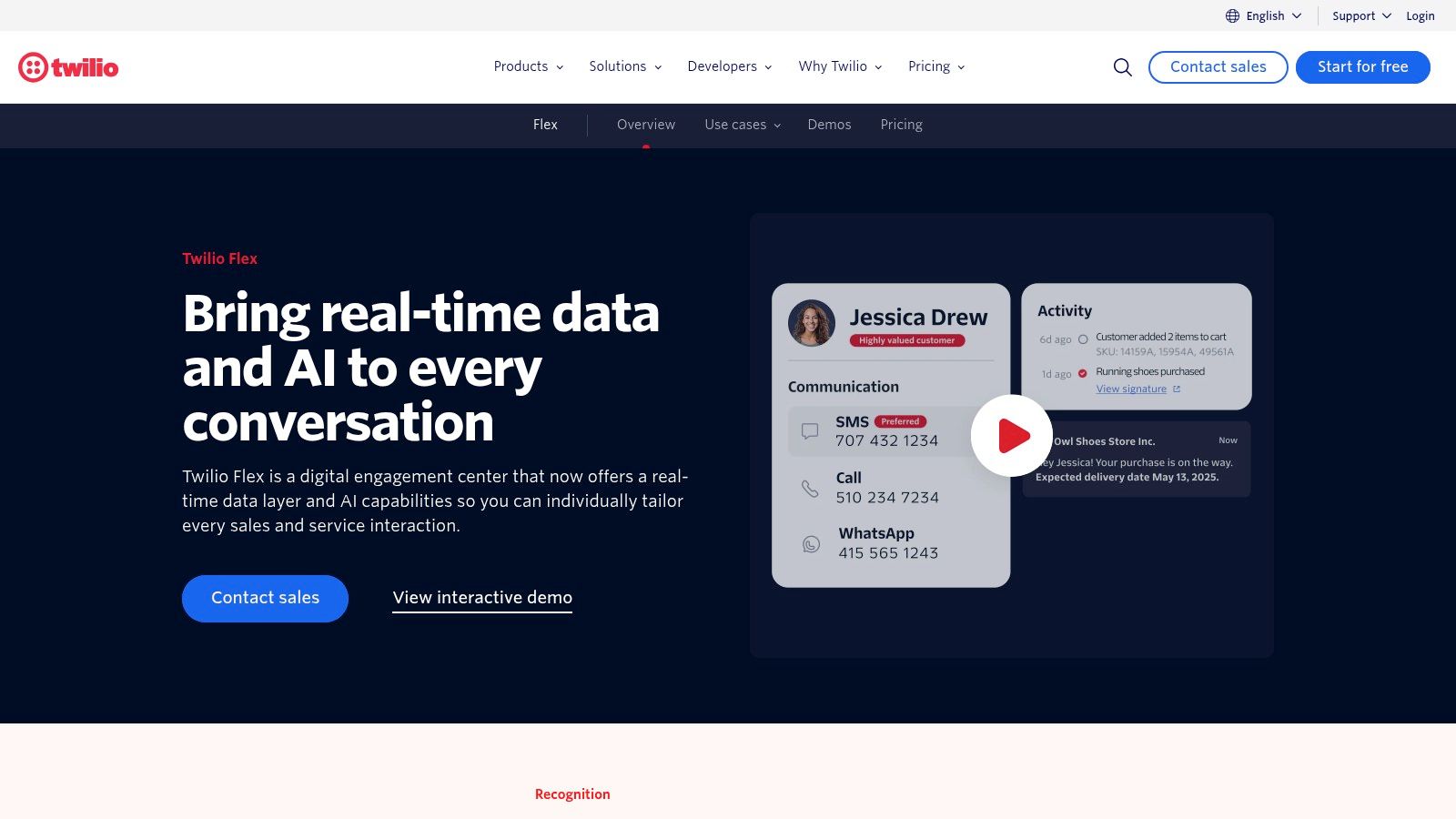
Built on Twilio's robust communication APIs, Flex allows developers to leverage the full power of Twilio's ecosystem. This includes voice, SMS, WhatsApp, video, and other channels, all integrated into a single platform. This omnichannel capability empowers agents to manage interactions seamlessly across various communication methods, providing a consistent and personalized customer experience. The platform’s task router, TaskRouter, intelligently distributes workloads, ensuring that agents are handling the most appropriate interactions based on skills, availability, and priority. Real-time dashboards and analytics provide valuable insights into agent performance, queue times, and customer satisfaction, allowing supervisors to optimize workflows and identify areas for improvement.
For businesses in the AE region dealing with diverse customer demographics and communication preferences, Twilio Flex's customization options are especially appealing. Imagine a business in Dubai needing to integrate its contact center software with a popular regional messaging app. With Twilio Flex, this becomes a possibility, allowing for personalized and localized customer engagement. Similarly, a fintech startup in Abu Dhabi can leverage Twilio's programmable platform to build automated fraud detection and prevention workflows directly within their contact center solution.
One of the most significant advantages of Twilio Flex is its pay-as-you-scale pricing model. Unlike traditional contact center solutions with hefty upfront licensing fees, Twilio Flex allows businesses to pay only for the resources they consume. This is particularly attractive to growing businesses in the AE region looking to avoid significant capital expenditure. Furthermore, the platform's rapid deployment and iteration capabilities enable businesses to quickly launch and refine their contact center operations, adapting to market changes and customer feedback with agility.
However, Twilio Flex’s flexibility comes at a cost. The platform's highly programmable nature requires significant development resources. Non-technical organizations might find the implementation challenging and may need to rely on external developers or Twilio partners. Costs can also escalate with heavy customization, making it essential to plan and budget accordingly. For organizations without in-house development expertise, considering pre-built integrations and leveraging the Twilio partner ecosystem can help streamline implementation and manage costs.
Compared to more traditional contact center solutions like Avaya OneCloud or Genesys Cloud, Twilio Flex offers greater flexibility and customization but requires a more hands-on approach. Solutions like Avaya or Genesys provide more pre-built functionalities and require less development effort, but they may lack the granular control and customization options that Twilio Flex offers. The choice ultimately depends on the specific needs and technical capabilities of the organization.
For organizations considering Twilio Flex, a few implementation tips can ensure a smoother rollout:
- Clearly define your requirements: Before starting development, thoroughly document your workflows, integration needs, and desired customer experience.
- Leverage the Twilio ecosystem: Explore pre-built integrations and the Twilio partner network to minimize development effort.
- Start with a pilot project: Begin with a small-scale implementation to test and refine your solution before a full-scale rollout.
- Monitor and optimize: Continuously track performance metrics and gather feedback to identify areas for improvement and optimize your contact center operations.
Twilio Flex's official website (https://www.twilio.com/flex) provides comprehensive documentation, tutorials, and community forums, which can be valuable resources throughout the implementation process. For businesses in the AE region looking for a highly flexible and customizable contact center solution, Twilio Flex provides a powerful platform to build a truly differentiated customer experience. However, it’s crucial to carefully consider the technical requirements and potential development costs before committing to this platform.
9. 8×8 Contact Center
For businesses seeking a robust and integrated solution, 8×8 Contact Center offers a compelling blend of enterprise-grade features and user-friendly design. This cloud-based contact center software seamlessly integrates with 8×8's unified communications platform, providing a complete solution for businesses of all sizes, particularly those in the mid-market and enterprise segments. This integration makes it a strong contender in the crowded contact center software market, offering a streamlined approach to communication and collaboration. It's especially valuable for organizations looking to consolidate their communication infrastructure and enhance overall efficiency.
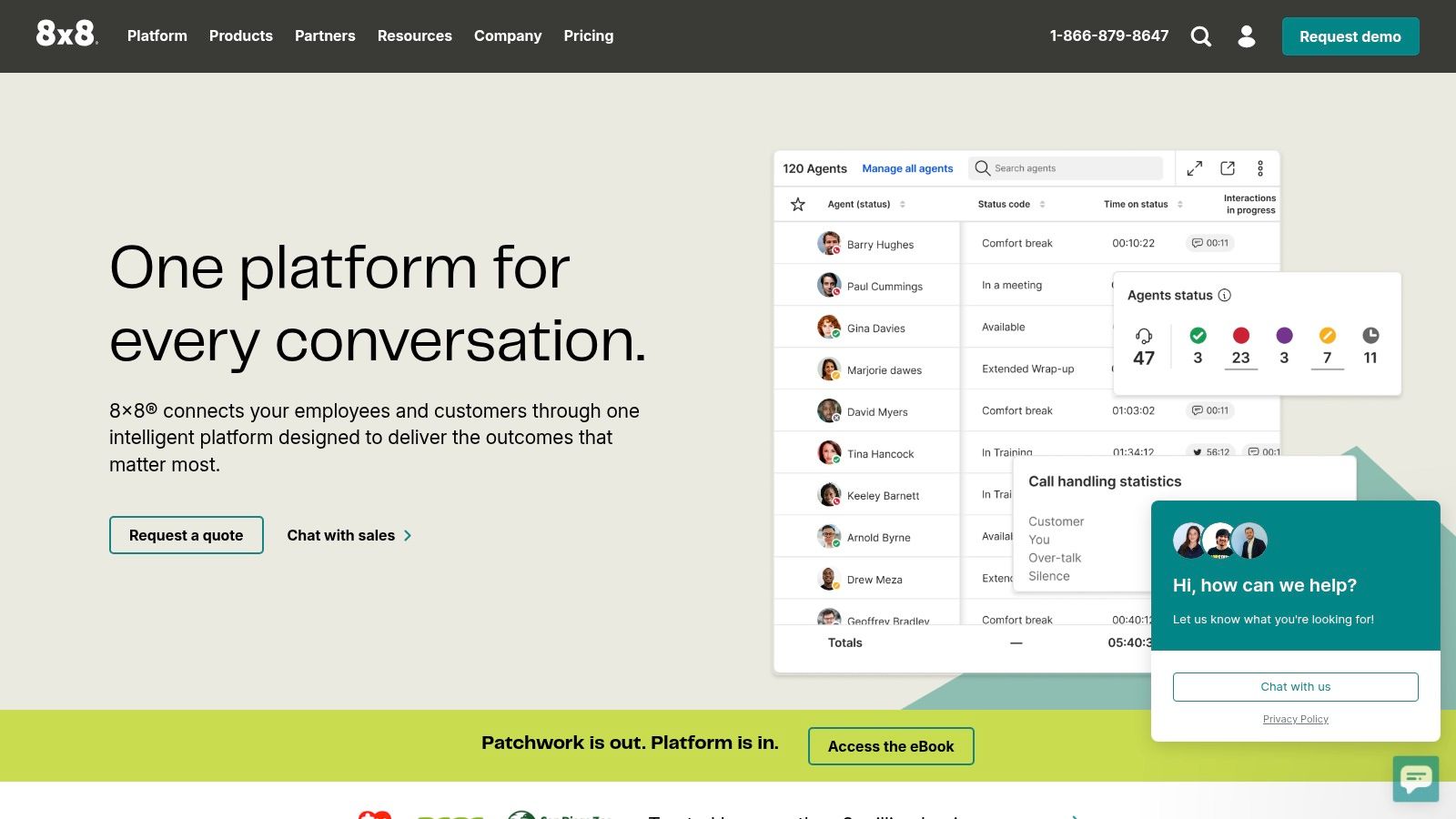
8×8 Contact Center stands out for its comprehensive feature set, designed to empower agents and enhance customer interactions. Omnichannel capabilities allow agents to handle inquiries from various channels—voice, email, chat, social media—within a single interface, providing a seamless and consistent customer experience. This unified approach eliminates the need for agents to switch between multiple applications, improving efficiency and reducing response times. For businesses operating in the AE region with diverse customer communication preferences, this omnichannel functionality is particularly beneficial.
Advanced workforce optimization tools within 8×8 Contact Center provide real-time insights into agent performance, enabling supervisors to effectively manage staffing levels, forecast demand, and optimize schedules. The platform’s quality management features, including call recording and real-time speech analytics, help identify areas for agent training and development, ensuring consistent service delivery. This focus on workforce optimization contributes significantly to improved agent productivity, reduced operational costs, and enhanced customer satisfaction.
Integration with popular CRM systems (Customer Relationship Management) is another key strength of 8×8 Contact Center. By connecting with existing CRM platforms, the software provides agents with a 360-degree view of the customer, enabling personalized interactions and faster resolution times. This integration is crucial for delivering tailored customer experiences, a key differentiator in today's competitive market. It also streamlines workflows and improves the efficiency of sales and support teams.
While 8×8 boasts numerous advantages, it's important to acknowledge some limitations. Its AI and automation capabilities are somewhat limited compared to other leading contact center software solutions. While the platform offers basic automation features, businesses looking for advanced AI-powered functionalities, such as chatbots or predictive routing, might find 8×8 lacking. Additionally, the user interface, while functional, could benefit from a more modern and intuitive design. Some users have reported that certain advanced features require additional licensing, which can add to the overall cost. Businesses should carefully evaluate their needs and budget to determine if 8×8 Contact Center aligns with their long-term goals.
Implementation and Setup: While 8×8 emphasizes ease of deployment, migrating a contact center to a new platform requires careful planning and execution. Businesses should engage with 8×8's professional services team or a certified partner for assistance with implementation and customization. Proper training for agents and supervisors is essential to maximize the platform's potential and ensure a smooth transition.
Pricing and Technical Requirements: 8×8 offers various pricing plans based on the features and functionalities required. Specific pricing details are available upon request from the 8×8 sales team. Technical requirements vary depending on the deployment model (cloud or on-premise) and integration with existing systems. Consulting with 8×8 or a certified partner is recommended to determine the precise technical requirements and ensure compatibility.
Comparison with Similar Tools: Compared to competitors like Talkdesk or Genesys Cloud, 8×8 Contact Center offers a strong value proposition for its comprehensive feature set, particularly for mid-market businesses. Talkdesk might offer more advanced AI and automation features, while Genesys Cloud is known for its extensive customization options. However, 8×8's tight integration with its UCaaS platform makes it a compelling choice for businesses seeking a unified communication and collaboration environment.
8×8 Contact Center earns its place on this list because of its robust feature set, reliable cloud infrastructure, and strong focus on workforce optimization. Its comprehensive capabilities, combined with its user-friendly design, make it a valuable asset for businesses looking to enhance customer interactions, improve agent productivity, and streamline communication workflows. Website: https://www.8×8.com
10. Talkdesk
Talkdesk is a robust, cloud-based contact center software solution designed primarily for enterprise-level businesses seeking advanced customer experience (CX) capabilities. Its focus on AI-powered automation, analytics, and industry-specific solutions makes it a compelling option for organizations looking to streamline operations, boost agent productivity, and deliver exceptional customer service. Talkdesk distinguishes itself through its extensive integration marketplace, allowing it to seamlessly connect with existing CRM, workforce management, and other essential business tools. This interconnectedness enables a unified view of the customer journey and empowers agents with the information they need at their fingertips. If you're looking for a comprehensive, feature-rich contact center platform capable of handling complex workflows and high call volumes, Talkdesk warrants serious consideration.
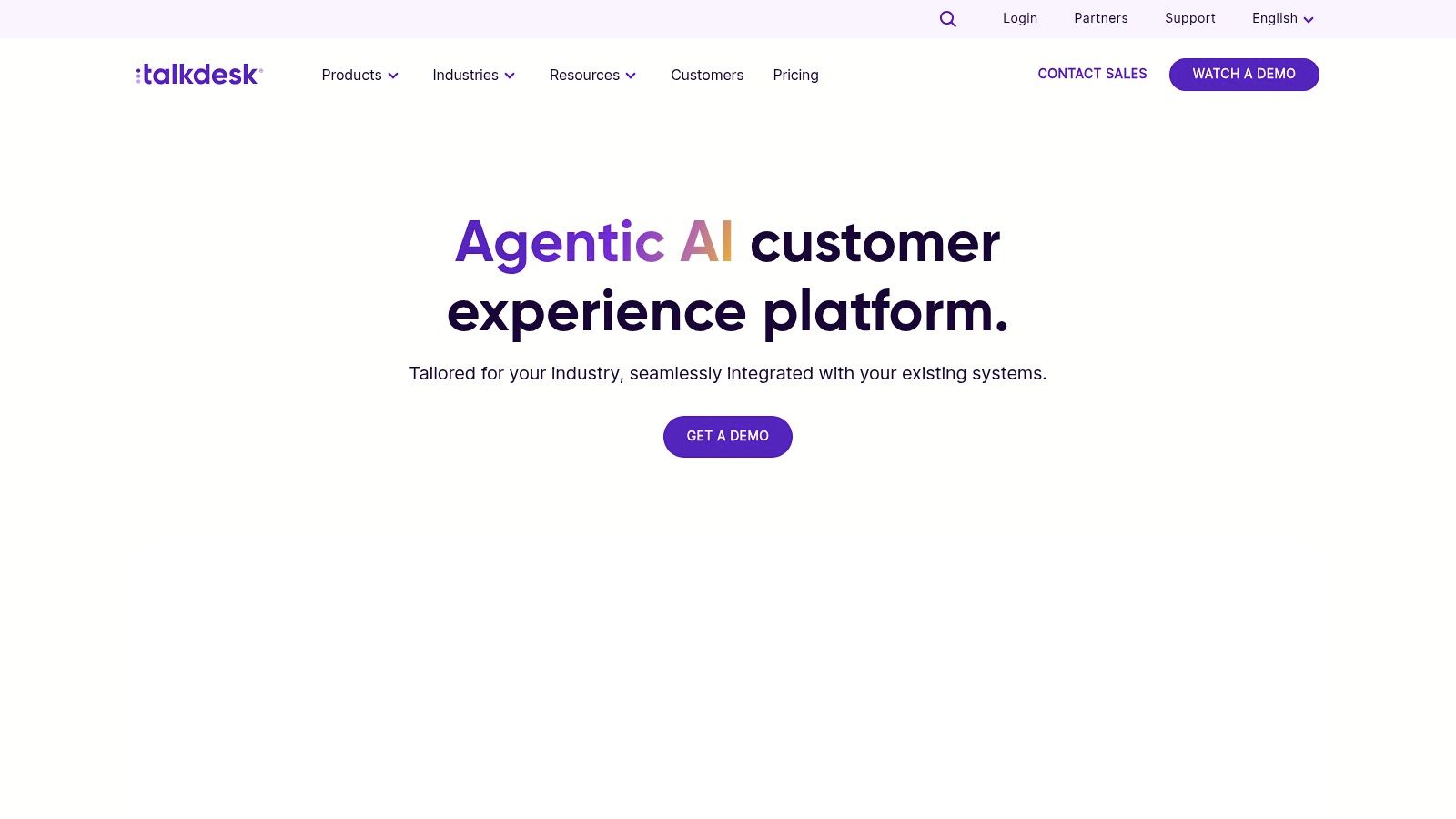
One of Talkdesk's key strengths lies in its AI-powered features. The platform leverages artificial intelligence to automate routine tasks, such as call routing and data entry, freeing up agents to focus on more complex customer interactions. Talkdesk's virtual assistants can handle basic inquiries, provide self-service options, and even escalate calls to human agents when necessary. This intelligent automation not only improves agent efficiency but also enhances the overall customer experience by reducing wait times and providing faster resolutions. Furthermore, Talkdesk’s advanced analytics provide valuable insights into key performance indicators (KPIs), allowing businesses to identify areas for improvement and optimize their contact center strategies. You can even gain deeper insight into your contact center performance with resources like the ones available at Learn more about Talkdesk.
Talkdesk offers industry-specific contact center solutions tailored to the unique needs of various sectors, including healthcare, finance, and logistics. These pre-built templates and workflows accelerate implementation and ensure compliance with industry regulations. For instance, healthcare organizations can benefit from HIPAA-compliant features, while financial institutions can leverage solutions designed to meet strict security and compliance requirements. This focus on industry specialization makes Talkdesk a particularly attractive option for organizations operating in regulated environments.
While Talkdesk offers a powerful suite of features, its complexity and premium pricing may pose challenges for smaller teams with limited budgets. The extensive feature set can be overwhelming for businesses that require only basic contact center functionality. The implementation process can also be time-consuming, requiring significant upfront planning and configuration. Therefore, small to mid-sized businesses should carefully evaluate their needs and resources before committing to Talkdesk. Alternatives like RingCentral or Five9 might offer a more suitable balance of features and affordability for smaller operations.
For larger enterprises, however, the investment in Talkdesk can yield significant returns. The platform’s robust integration ecosystem allows for seamless data flow between different business systems, enhancing collaboration and improving overall operational efficiency. The advanced workforce engagement management tools enable supervisors to monitor agent performance, provide targeted coaching, and optimize scheduling. Real-time performance dashboards empower managers to make data-driven decisions and proactively address potential issues.
Talkdesk's pricing is typically subscription-based and varies depending on the specific features and functionalities required. Contacting Talkdesk directly for a personalized quote is recommended, as pricing can be tailored to individual business needs. Technical requirements are minimal, as the platform is cloud-based and accessible via a web browser. However, reliable internet connectivity is crucial for optimal performance.
Implementing Talkdesk effectively requires careful planning and collaboration between IT teams and business stakeholders. Clearly defining business objectives, integrating with existing systems, and providing comprehensive agent training are essential steps for successful implementation. Leveraging Talkdesk's professional services team can also help streamline the process and ensure a smooth transition.
In summary, Talkdesk is a powerful contact center software solution that excels in AI-powered automation, industry-specific solutions, and extensive integrations. While its premium pricing and complex features may not be suitable for all businesses, particularly smaller teams, larger enterprises seeking a comprehensive and scalable platform can benefit significantly from Talkdesk's robust capabilities. Its focus on customer experience, coupled with advanced analytics and workforce engagement management tools, makes it a compelling option for organizations looking to elevate their customer service operations.
Contact Center Software Feature Comparison
| Solution | Core Features & Integrations | User Experience & Quality ★★★★★ | Value Proposition 💰 | Target Audience 👥 | Unique Selling Points ✨ |
|---|---|---|---|---|---|
| 🏆 Cloud Move | Multichannel (Voice, SMS, Social, WhatsApp), CRM integrations | Crystal-clear voice, 24/7 support | Flexible deployment, customizable | SMBs to enterprises, regulated sectors | Unified interface, local compliance, free demo |
| Zendesk | Omnichannel support, ticketing, CRM integration | Intuitive UI, strong support | Flexible pricing tiers | SMBs to enterprises | 1000+ app integrations, easy to use |
| Five9 | AI routing, workforce optimization, speech analytics | Advanced AI, scalable | Premium, enterprise focused | Large enterprises | AI & automation, predictive dialing |
| Genesys Cloud CX | Omnichannel orchestration, journey analytics, AI bots | Scalable, powerful APIs | Premium pricing | Mid-market to enterprise | Customer journey mapping, strong AI |
| RingCentral Contact Center | UCaaS & contact center integration, mobile apps | User-friendly, competitive pricing | Mid-market pricing | Mid-market businesses | Unified communications integration |
| Amazon Connect | Pay-per-use, AWS AI services, API-first design | Reliable, scalable | Cost-effective, pay-as-you-go | All sizes, technical teams | AWS ecosystem leverage, no upfront cost |
| Freshworks Customer Service | Omnichannel ticketing, CRM, AI chatbots | User-friendly, easy setup | Affordable for SMBs | Growing businesses | Integrated CRM & marketing automation |
| Twilio Flex | Programmable platform, omnichannel, custom integrations | Highly flexible, developer-focused | Pay-as-you-scale | Developers, highly technical teams | Fully customizable, API-driven |
| 8×8 Contact Center | Omnichannel, workforce optimization, CRM integration | Reliable cloud, good value | Enterprise features, competitive | Mid-market & enterprises | UCaaS integrated, speech analytics |
| Talkdesk | AI automation, industry templates, workforce engagement | Strong CX focus, robust integrations | Premium, enterprise market | Enterprise CX teams | Industry-specific solutions, AI-powered automation |
Choosing the Right Contact Center Software for Your Business
Finding the perfect contact center software can feel overwhelming with so many options available. From established players like Zendesk, Five9, Genesys Cloud CX, RingCentral, Amazon Connect, Freshworks, Twilio Flex, 8×8, and Talkdesk to innovative solutions like Cloud Move, each platform offers a unique set of features and capabilities. This listicle has provided a comprehensive overview of ten leading contact center software solutions, highlighting their strengths and weaknesses to help you navigate this complex landscape. Remember, the most important takeaways are to carefully consider your business size, budget, scalability requirements, and desired features. Organizations in regulated sectors should prioritize compliance features, while customer-centric businesses should focus on multichannel engagement and agent performance tools.
When choosing contact center software, it's helpful to consider how it integrates with your existing systems, especially your customer relationship management (CRM) platform. A robust CRM system can streamline your customer interactions, centralize data, and improve overall efficiency by connecting your sales, marketing, and customer service efforts. This integration can be crucial for providing seamless customer experiences and maximizing the value of your contact center software investment.
Choosing and implementing the right contact center software is a strategic investment that can transform your customer service operations. By focusing on your specific needs and considering the insights provided in this article, you can empower your agents, enhance customer satisfaction, and drive business growth. Are you ready to elevate your customer experience and streamline your communications? Explore Cloud Move, a leading contact center software solution designed to empower businesses in the AE region with advanced features and scalable solutions. Discover how Cloud Move can help you optimize your customer interactions and achieve your business goals.



